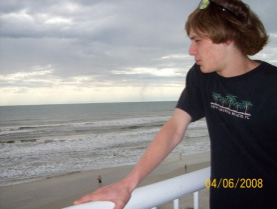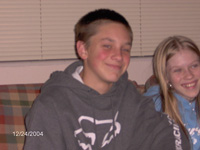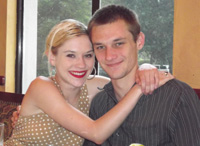Drugs Discovered Worried Home Turmoil Puzzled? What to do? Get Educated, Actions taken
My Son's Story

Robert "Robby" Andrew
Most drug addiction websites or books that include a discussion about a loved one have a successful sober ending. You may be surprised to find out that this website does not have that happy ending. I was nearly halfway through writing my book and then designing this website when my son tragically died of an overdose after fighting a six-year battle. At first I was not going to continue to complete the book or website since my son had the worst possible outcome. I thought that anything that I would write would be viewed as somehow ineffective in battling addiction. You might rightly ask how I could offer anything of value since my son, despite our well-thought-out action plan, suffered the worst outcome imaginable. At first, it did seem counterintuitive to create the website.
After thoughtful consideration, I realized that I had learned a wealth of information from Robby during his six-year battle with opioid addiction. I lived through a variety of experiences that became stories with cautionary warnings to pass on. After his overdose in 2013, I acquired additional knowledge through continuing my education about addiction. I discovered useful addiction-fighting resources and options, such as medication-assisted treatment.
The best doctor cannot save every patient. Just because oncologists lose most of their patients, doesn’t mean the methods and strategies utilized are not valid. If I were seriously hurt in a car accident, I wouldn’t blame my wearing a seatbelt as the cause. So how could the resources and methods I have learned about and wish to share not be useful? What I offer are personal insights to my parental experiences and education about opioid substance-use disorder. It is my belief that parents need to immediately become educated on drug addiction, learn and utilize available resources, and fight diligently using evidence-based treatments as we did. A variety of results are possible, including sobriety, incarceration, or even death. All parents should seriously ponder these possible outcomes.
There have been many rich and famous people who died from drug overdoses despite receiving the very best treatment that money can buy. The treatment methods they used may have bought them additional time and given hope to their families for a sober outcome.
Readers of this site or the book that also apply the best resources with a seemingly strong commitment to sobriety, an adult child might still suffer a tragic overdose despite all these actions. If this happens, parents shouldn’t second-guess or blame themselves, thinking they weren’t perfect parents or didn’t use the right treatment. Parents often play the could have, would have, should have game. I strongly advise parents to not play that game.
Although my son died from an overdose, I choose to focus on the fond memories I have of him rather than on all the heart-wrenching moments of his six-year addiction battle. When I think about Robby or share stories about him, I focus on his kindness, his intelligence, his sense of humor, and his amazing artistic talent. But most of all, I remember the steadfast love and loyalty he showed toward his family and his friends. I encourage all parents in my situation to focus on who their precious children really were before addiction destroyed their lives.
When we think or talk about our children to others, we should recall their wonderful talents, personality traits, characteristics, skills, and the love they shared prior to addiction. It may take time for a parent to be able to focus on the positive and good moments of an addicted loved one’s life rather than the years in which addiction completely changed the loved one’s personality and behavior. Although I have learned how to focus on the positive, my wife has had a more difficult time letting go of the bright future she had envisioned for our beautiful boy. It is important for spouses to be sensitive to one another in their grief journeys since healing takes place on different time schedules.
My son’s personal journey
My son, Robby, was a tall and handsome young man with a quiet demeanor who shared his kind heart and his gentle way with everyone. Growing up, he was a very happy boy who was extremely close to his only sibling, Sarah. They enjoyed a close relationship in the formative years, but by high school his early addiction began to strain their relationship.
Above all, Robby was loving and loyal to his family and friends. I remember one time, when Robby and Sarah were in high school, a boy they both knew said something false and cruel about Sarah. Robby’s first impulse was to defend Sarah by beating the boy up. Taking the higher moral ground, Robby settled for defending Sarah verbally and warning the boy that if he ever said another disparaging thing about Sarah, he would live to regret it. Robby was ready and willing to protect Sarah from anyone who would ever harm her in any way. I remember he once said to us, “Don’t worry; if a bad guy ever breaks into our house, I will take care of business!” He was referring to his readiness and ability to defend our family with his shotgun. Robby was a fearless and loyal son to us and brother to Sarah.


Robby unscathed at 11 yrs old with his sister At 20, 4 years into his battle, he manages a smile
Growing up, Robby was a very active boy. From airborne skateboarding tricks to sporting a motorized scooter, he was always on the move. He always shared his latest method of transport with Sarah. They both became involved in team sports in elementary school. Robby played Upward Basketball throughout elementary school, was on the middle school track team, and played on the varsity high school tennis team in 9th and 10th grade. Robby also competed in BMX racing with a souped-up Mosh bike that he was very proud to own.
Robby also loved water sports, taking after his grandfather, Bob, for whom he was named. He loved fishing, enjoyed jet skiing, and excelled at skimboarding. Once, he even convinced me to try skimboarding. Robby laughed good-naturedly at my less-than-graceful attempt to surf across the water.
Robby successfully auditioned for and played drums in the school band through middle school. We bought him an expensive drum set and he began to take lessons. Within few months, Robby became so good that his drum instructor said, “He is such a natural talent and quick learner, I have taught him everything I know.” Robby then decided to start a band with some of his closest middle school friends. I still have happy memories of them practicing in our music room.
Robby was a quiet leader whose friends frequently came over after school to play sports, games, or just hang out on our back porch. Through the years, he always had many friends at his birthday parties, which were wonderful celebrations, involving activities such as pony rides, bounce houses, go-karting, and even rock climbing. He maintained many of these same friendships well into his late teens and early twenties.
Unfortunately, once Robby and his friends began high school, they started experimenting with drugs and alcohol. One of Robby’s closest friends told us that although Robby was the last in his peer group to try pot, once he started, he began to feel more relaxed and less anxious. Some of the friends then started using opioids and introduced Robby to them. Beyond peer pressure, I think he began to self-medicate his bipolar anxiety condition he was experiencing. Although using opioids was simply a phase for most of Robby’s friends, it became an eventual death sentence for Robby.
Most of Robby’s friends are drug free now, although many are not alcohol free and a few might even have an issue. One of Robby’s friends is in jail, a number of friends died, as Robby did, after successfully completing rehab, and one of his closest friends died of a drug overdose after years of successful sobriety. Parents should be prepared for any of these outcomes if their loved ones begin experimenting with drugs, especially opioids. There is simply no guaranteed outcome.
When I was growing up, my father took my brother and me out to the gun range for target practice. He had a variety of firearms that he taught us to shoot. I told Robby all about my experiences shooting guns with my father and brother. When Robby was old enough, he purchased a couple of rifles and often went to the gun range with his friends for target practice. One time, he asked me to go to the gun range with him. It was very thoughtful that he asked me to go with him, and I regret not going. But by then Robby had begun to experiment with drugs, and I didn’t want to sent the wrong signal. I didn’t think drugs and guns were a good mix.
I always cautioned Robby about the dangers of firearms and their safe use, and he never used drugs when he went shooting. Although I missed out on the opportunity to spend more time with Robby and have that valuable father-son bonding experience, I made the right but difficult decision in not encouraging my addicted son’s use of firearms.
Robby was an intellectually gifted young man and an excellent student. Additionally, at an early age, he showed exceptional talent in art. He wrote and illustrated delightful storybooks and created amazing miniature movie flip books. We often encouraged Robby to explore a possible career as either an illustrator or as an architect like my father. To this day, we still have all of Robby’s artwork and flip books. Intellectual or artistic ability was not a determinative factor in the start of his substance-use disorder.
In middle school Robby was invited to participate in the Duke Talent Identification Program. He was also part of the advanced enrichment program at his school. He continued his art, but then began his focus on playing drums for the school band and later started his own band playing the drum set. Robby made mostly the school grade of "A" in his coursework up until his freshman year in high school when he began smoking pot. Although when I spoke to Dr. Sanjay Gupta, MD, chief medical coorespondent for CNN about my son, he indicated that there is no evidence showing that Cannabis or Marijuana use is linked with moving on to harder drugs such as opioids.
In high school, Robby was enrolled in the Engineering, Science, and Technology Program for the first two years, and his grades were still fairly good until his junior year. As a gifted artist, he excelled in the CAD classes that were part of the curriculum. But by Robby’s junior year, when he got involved in harder drugs than pot, he dropped down to regular classes and quit the varsity tennis team. His days of academic excellence were over, and although he did manage to finish a dual enrollment culinary program, Robby never graduated with his high school class. Because of his substance use-disorder, our gifted boy ended up earning a GED instead.
Parents should be warned not to focus their efforts soley on graduation, as important as this is to everyone. Your adult child might instead need to be detoxed now followed by living at a residential rehab. Let me put it in perspective, by postponing immediate actions that leads to the needed treatment, the risk of possible overdose death will unnecessarily increase. A physician of my son's cautioned us early on to not fixate too much of our energies on graduation but instead give top priority on sober producing actions that prevent overdose death. This insight will be difficult for some parents to shift their priorities and focus.
Robby looked for a direction after high school. He began to explore a variety of opportunities consistent with his interests and skills. Robby and I often discussed having a father-son business together. One possible business was creating and operating a recording studio for up-and-coming artists. Robby was really interested in music during this period, and I had always toyed with this idea myself since I love music and play the guitar, drums, and beginners piano. He could have pursued a solo career in the music field with his percussion talents.
Another idea we talked about was buying, fixing up, and flipping homes. He and I liked to drive around looking for prospective houses. He also showed an interest in becoming a culinary chief and took some classes towards this goal. He became quite good, and was able to grill anything to perfection quickly surpassing my skill and expertly use a knife to rapidly slice up food.
As parents, we tried to present Robby with a hopeful vision of a successful future. We offered to send him to the Culinary Institute of America in New York, which is the best culinary school in the United States. Unfortunately, his addiction torpedoed this vocational track despite his talent and interest in a culinary career.
Robby did manage to hold down a few restaurant jobs as he battled his addiction. His first two jobs were in fancy, expensive restaurants where he earned a very good wage. His last job was in a high-end fast food chain where he worked as a cook for nearly a year. But as his addiction disease progressed, it became difficult for him to remain reliable. He began to call in sick as he went through withdrawals or was not sober enough to work. Our addicted loved ones are often not able to function in maintaining a job for any length of time, although receiving a paycheck can be a huge motivator for them.
Despite the many detox and rehab facility treatments and evidence-based medications he received from his doctor, who was an addiction specialist, Robby first overdosed in our own home. The overdose occurred on his first night home after successfully completing a five-month inpatient treatment program. What we didn’t know was that Robby ironically decided to celebrate finishing his program by ingesting some opioids for old times’ sake. His body was unable to process the dosage he used to take prior to going to rehab, and he almost died.
We found him, called 911, and the paramedics rushed to our home and saved him with an intravenous dose of Narcan. Robby spent the first few days of his hospital stay in intensive care. After he was released, he stayed clean for a while. But then he began using opioids again within a month of his near-fatal overdose. I know, it doesn’t make sense to sober non-addicted individuals when stories like this are told.
When Robby was twenty-two-years old, after staying sober and then relapsing time and again, we sent him 1,000 miles away from home to a nationally recognized out-of-state rehab facility. He again received counseling and other residential rehabilitative services similar to those he had received from past providers. He was supposed to remain in the program for at least three months, and we worked it out with the rehab that we would pay for whatever additional time beyond three months that Robby needed.
Robby seemed to be doing well when we spoke to him on the phone, but he was beginning to become restless. Against medical advice and in opposition to our family’s advice, he discharged himself after only a month of rehab. Upon his discharge, he left with another fellow resident that he had befriended who was also discharged on the same day as Robby.
I spoke to Robby each day after his discharge, warning him on both Friday and Saturday nights that he was in the most dangerous time after rehab since his opioid tolerance level would be very low and his temptation to use would be high. He said, "I know, Dad. I know.” The last thing we said to one another was "I love you, and I will talk to you tomorrow." Little did I know that that would be the last time I would ever speak to my son.
Two days after leaving rehab, Robby overdosed at his friend's mother's home and died despite his friend and the paramedics attempts to revive him. I was devastated for Robby’s loss of life, and for my loss of Robby, my only son. I was in shock, couldn’t sleep, questioned all my preconceived notions and slipped into depression within my grief. Some counseling, a trip to the doctor and participation in a grief group was my next step. My life suddenly became divided by everything that happened during his life and what happened since his overdose.
As I now reflect back as my deep scars have begun to heal, I am grateful that Robby and I always had a close relationship. We never hesitated to say that we loved one another. I hugged him as often as I could to affirm this. It is critically important that we tell our children, especially our addicted loved ones, how much we care and love them, and that it is not contingent on whether or not they are clean and sober. Don't ever give up on your child, we never did, and he knew that to the end that we loved him unconditionally.
For those of you who are interested, more details of Robby’s story are discussed in my upcoming book. The purpose this website as well as my book is to quickly educate parents about opioid addiction to improve informed decisions by providing resources and options to consider. I hope to do this by sharing Robby’s story, telling about our experiences in dealing with his addiction, discussing the various ways we tried to help him, and informing parents of addicted loved ones about what they might expect based upon our son’s six-year battle with addiction.





